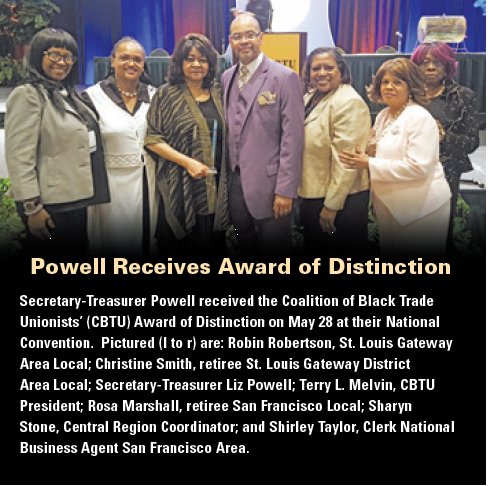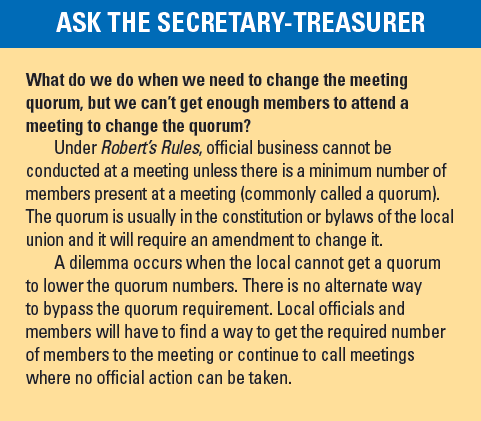Your Local Election Committee
July 1, 2017
(This article first appeared in the July-August 2017 issue of The American Postal Worker magazine)
By Secretary-Treasurer Liz Powell
Union elections represent one of the foundations of our democracy. Union members have the right to nominate and vote for their leadership and those officers who will be placed in charge of protecting the rights of postal workers and the administration of the union.
The Law
The right to elect union officials is mandated by federal law. The Labor Management Reporting and Disclosure Act reads, “Terms of Office; Election Procedures (29 U.S.C. 481) SEC. 401. (b) Every local labor organization shall elect its officers not less often than once every three years by secret ballot among the members in good standing.”
Local unions may choose to have elections every one or two years, but there must be an election at least once every three years. The frequency of elections should be addressed in the local’s constitution.
The National Constitution
In order to comply with the legal obligation to have elections, the APWU adopted language in The National Constitution and Bylaws to assist local and state unions. Article 12 of The National Constitution and Bylaws of the APWU requires that every local “establish an election committee, no member of” which shall be a candidate for election while serving on such committee.
The election committee shall be responsible for the conduct of the election and shall decide all controversies arising out of the election process. Locals will decide the number of committee members and how the committee is formed. The election committee can be either elected or appointed as per the local’s constitution. Members of the committee are expected to serve throughout the entire election process. If for some reason a committee member is unable to serve, he or she may be replaced, if possible. If for some reason there are not enough local members to form a committee, please contact the Secretary-Treasurer’s Department for assistance.
The Election Committee
Election committee members are responsible for conducting your union’s election of officers, in accordance with federal law and your union’s constitution and bylaws. This committee should be in place as the first step of the election process.
Throughout the election process, election officials should be guided by three principles. First, you should be fair and impartial, treating all candidates equally and avoiding any acts of favoritism or even the appearance of favoritism. You should maintain a businesslike relationship with all candidates, even if you work with or are personal friends with any of them. Second, you must follow the election provisions in your union’s constitution and bylaws as well as any other union election rules, so long as they are not inconsistent with federal law. Finally, you should uphold American democratic traditions by protecting the right of every member in good standing to nominate candidates, run for office and vote by secret ballot for officers of your union. (Department of Labor, A Guide for Election Officials)
any acts of favoritism or even the appearance of favoritism. You should maintain a businesslike relationship with all candidates, even if you work with or are personal friends with any of them. Second, you must follow the election provisions in your union’s constitution and bylaws as well as any other union election rules, so long as they are not inconsistent with federal law. Finally, you should uphold American democratic traditions by protecting the right of every member in good standing to nominate candidates, run for office and vote by secret ballot for officers of your union. (Department of Labor, A Guide for Election Officials)
The local election committee (LEC) should formulate election rules, post-election notices for the membership, update the membership mailing list, document acceptance of nominations and verify that candidates meet qualification requirements. The committee also prepares the ballot, collects or counts the ballots and certifies the election results (some committees supervise outside ballot companies who perform some of these duties).
If the local union will have members voting at a polling place, the committee would have to make sure that the polling place is open long enough to allow members an opportunity to vote, provide for absentee balloting and maintain the security of the ballots. Finally, the LEC would investigate and render a decision on any election complaints or grievances.
When investigating election complaints, the committee is looking for actions or conduct that would influence the outcome of the election. The use of union or employer funds, poor security of the ballots, improper nomination or election notice and use of local or national union logo on campaign material are some typical examples of actions or conduct that could affect the outcome of an election.
All decisions on election grievances must be in writing and if the grievance is denied, the written decision should provide the appeal procedures in Article 12 of the National Constitution.
Help Is Available
The Secretary-Treasurer’s Department can provide online training to assist local election committees. This training webinar lasts approximately two hours. It only requires a high speed internet connection, speakerphone and a space where the committee can comfortably watch a computer monitor or project an image. Additional committee resources are available on the APWU website at www.apwu.org/issues/election-union-officers.




